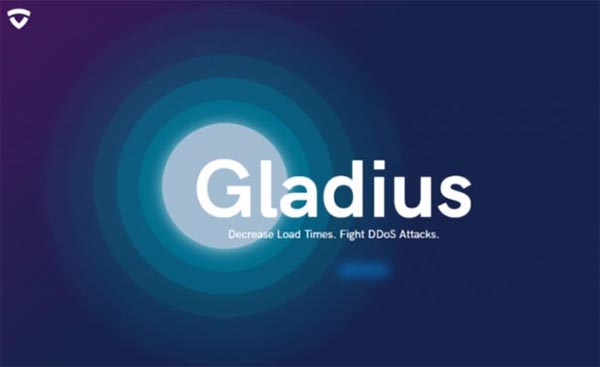As of September 2017, ICOs, or initial coin offerings, have raised over $2.3 billion. This amounts to almost $8.5 million a day. There was an incredible stretch over the four months beginning in Q2–$103 million was raised in April, $232 million in May, $462 million in June, and $574 in July.
ICOs have become an attractive counterpart to traditional IPOs and venture capitalism, as ICOs are based on promising blockchain technology and typically have much less regulatory oversight. With so many options to choose from, however, investors can feel overwhelmed at the smorgasbord in front of them.
Some sites like CryptyoCompare and Token Market have an ICO calendar that lets potential investors peruse daily listings and decide which offerings are the most attractive. To help narrow down the choices, here are the Top 5 ICOs for the month of November.
1. Gladius – DDoS Protection and CDNs

DDoS (distributed denial of service) attacks are some hackers’ weapon of choice. These lethal attacks compromise a network of computers and use the bandwidth to inundate their target with meaningless requests. The goal is to completely crash the system.
The rise of DDoS attacks has led some to flee traditional, centralized defenses for blockchain based platforms. These blockchain platforms allow users to rent out existing bandwidth and computing power to other participants. These participants can form local pools and join resources, resulting in a powerful network capable of stopping an onslaught of DDoS attacks.
One company, Gladius, specializes in decentralized bandwidth sharing and content delivery networks (CDNs). Their proprietary platforms set users up with a desktop portal that can monitor bandwidth and traffic statistics. Additionally, users can search the online marketplace to find a network pool that meets their needs. Since the platform is decentralized, users have a greater choice of options as well as more competitive pricing.
Gladius’ ICO begins on November 1 and can be found on their website.
2. Indahash – Online Marketing through the Eyes of Blockchain
Digital marketing is making everyone money–agencies, companies… well, maybe not consumers. Whatever the case may be, digital marketing spend is on the up and up. Some predict that in the U.S. alone digital marketing spend will top $120 billion by 2021.
IndaHash is an award-winning app that has connected over 300,000 influencers from 70 markets all over the world. They want to take the next step in online marketing and tokenize the influencer industry to create a direct relationship between vendors and clients.
The goal is to take the app in its current form and integrate tokens that are used on a blockchain platform, allowing participants across the globe to interact with one coin. The integration of a single blockchain token will allow compensation to be more flexible–various pricing models are available and further connect global users.
IndaHash’s pre-ICO will begin on November 8 and run for a week. Only registered parties are allowed to participate, so interested investors should begin the process now.
3. CanYa – Peer-to-Peer Services at Lower Cost
When Ikea acquired TaskRabbit, the world was finally able to understand how serious this gig economy “fad” is. With millions of Americans a part of a growing segment in the overall economy, some companies are attempting to make changes using blockchain technology.
One company, CanYa, is in process of creating a decentralized marketplace where service providers and clients can interact directly. From the blockchain platform, potential customers can search the marketplace to find a service provider suitable for their needs. The services range from personal items like tutoring and makeovers to more handyman-like jobs such as bathroom renovations or roofing repairs.
CanYa’s platform allows service providers to set their own prices, schedule of payments, and recurrence of services. Clients are able to choose an option that best fits their needs. Best of all, because a third party organizer is no longer needed, fees are much lower than traditional sites like Craigslist of Upwork.
CanYa’s ICO can be accessed via their website and begins on November 15.
4. BitClave – The Search Engine that Protects Consumers First
Google dominates all other search engines. The second place engine, Bing, doesn’t even come close. As Google looks more and more like a monopoly, some companies are looking to challenge the tech giant with blockchain technology.
One company in particular, BitClave, is creating a decentralized search engine where customers, not centralized corporations, control their identity. Current search engines track every move and then spam users with ads based upon past inquiries. The “consent” is in the fine print buried in technical language.
BitClave’s decentralized search engine allows users and businesses determine who has access to their data and how they can use it. They are also compensated by businesses who utilize their data by making them recommendations, all with users’ explicit permission. Thus BitClave promotes search engine ads like Google and Bing do–without violating consumer protection and privacy.
BitClave’s crowdsale begins November 8 and ends on December 8. Details can be found on their website.
5. Confideal
Smart contracts are one of the crown jewels of blockchain technology. These contracts are self-executing and automatically conduct transactions the moment the contract’s conditions are met. This results in higher transparency and greater trust–not in other parties, but in the blockchain system itself.
One company, Confideal, is creating a platform that helps the average user to create, manage, and enforce smart contracts. The platform is set up in such a way that users with no coding skills or software programming skills are able to create effective smart contracts.
Their hope is that individuals and businesses alike will begin drafting smart contracts, adding transparency and fluidity to the blockchain systems in place. The platform provides a full array of tools that users can utilize to build their contracts, while also having access to highly-skilled arbiters who can resolve conflicts arising from the smart contracts.
Confideal’s ICO runs from November 2 through November 22. Further information can be found on Confideal’s website.
Note: The opinions in this article are solely those of the author and should not be construed as investment advice. Always do your own independent research into any project before investing.
What do you think of the ICOs on this list? Do you think that there are other ICOs that should be listed? Let us know in the comments below.
Images courtesy of Shutterstock, Gladius, YouTube










